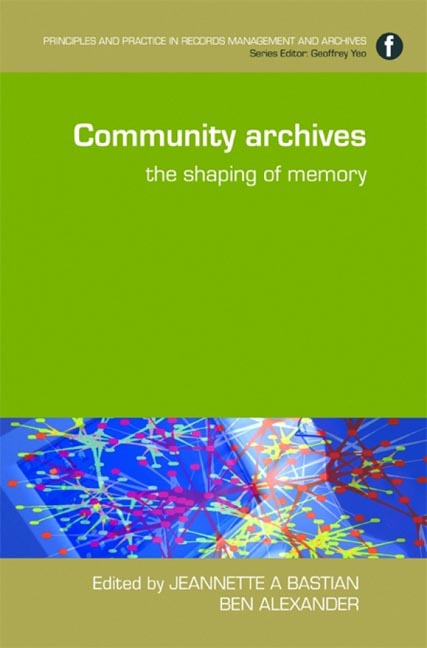Book contents
- Frontmatter
- Contents
- Introduction to the series
- Acknowledgements
- Contributors
- Introduction: Communities and archives – a symbiotic relationship
- Part 1 A community archives model
- Part 2 Communities and non-traditional record keeping
- Part 3 Records loss, destruction and recovery
- Part 4 Online communities: how technology brings communities and their records together
- Part 5 Building a community archive
- 11 ‘All the things we cannot articulate’: colonial leprosy archives and community commemoration
- 12 Overcoming anonymity: Kittitians and their archives
- 13 Always queer, always here: creating the Black Gay and Lesbian Archive in the Schomburg Center for Research in Black Culture
- Conclusion: The archivist and community
- Bibliography
- Index
- Miscellaneous Endmatter
- Miscellaneous Endmatter
- Miscellaneous Endmatter
12 - Overcoming anonymity: Kittitians and their archives
from Part 5 - Building a community archive
Published online by Cambridge University Press: 08 June 2018
- Frontmatter
- Contents
- Introduction to the series
- Acknowledgements
- Contributors
- Introduction: Communities and archives – a symbiotic relationship
- Part 1 A community archives model
- Part 2 Communities and non-traditional record keeping
- Part 3 Records loss, destruction and recovery
- Part 4 Online communities: how technology brings communities and their records together
- Part 5 Building a community archive
- 11 ‘All the things we cannot articulate’: colonial leprosy archives and community commemoration
- 12 Overcoming anonymity: Kittitians and their archives
- 13 Always queer, always here: creating the Black Gay and Lesbian Archive in the Schomburg Center for Research in Black Culture
- Conclusion: The archivist and community
- Bibliography
- Index
- Miscellaneous Endmatter
- Miscellaneous Endmatter
- Miscellaneous Endmatter
Summary
Introduction
Many natives of St Kitts have claimed that they do not care about the past because there is nothing in it that is worth remembering. The complexities of the relationship of post-colonial societies and their history have often had an impact on the way archives are viewed. Kittitian researchers approach them with a sense of awe, that something so old has survived while others call them ‘white people archives’ and refuse to use them. The statement is a rejection of the archives of the colonizer and a yearning for what is not there – an archive of the colonized. Trouillot writes, ‘Silences are inherent in history because any single event enters history with some of its constituting parts missing. Something is always left out while something else is recorded’ (Trouillot, 1995, 49). Since power and the ability to create archives rested with the island's elite, the records naturally reflect the events they felt were important. As a consequence records are often obstacles that hide and distort significant elements of the history of the colonized (Bastian, 2006, 267). Accounts of visitors to St Kitts and the Caribbean speak of the cheerful singing of the field gangs, but there was nothing enjoyable about the cane fields. The songs, often protests or prayers, were a tool, developed in Africa, to co-ordinate team effort in agricultural activities (Abrahams and Szwed, 1983, 46). By recognizing that the archive was an inherent part of the machinery of colonialism, one becomes conscious of its limitations in contributing to the history of the colonized in a post-colonial community and yet it is still a source of information about them.
For the Kittitian community the ‘daily recounting’ (Connerton, 1989, 17) or gossip of village life gives rise to a history that is immediate, accessible and appealing to a people whose roots had been severed and who were governed by an alien elite. However in government and in organizations, reliance on memory places severe limitations on decision making. The administration of self-governing St Kitts had to learn the importance of records quickly and almost entirely without assistance. Convincing the rank and file of the civil service to comply with this need required training and the nurturing of a new culture that was inconsistent with what existed in the villages. Without this change, Kittitians stand the risk of silencing themselves.
- Type
- Chapter
- Information
- Community ArchivesThe shaping of memory, pp. 221 - 234Publisher: FacetPrint publication year: 2009
- 1
- Cited by



